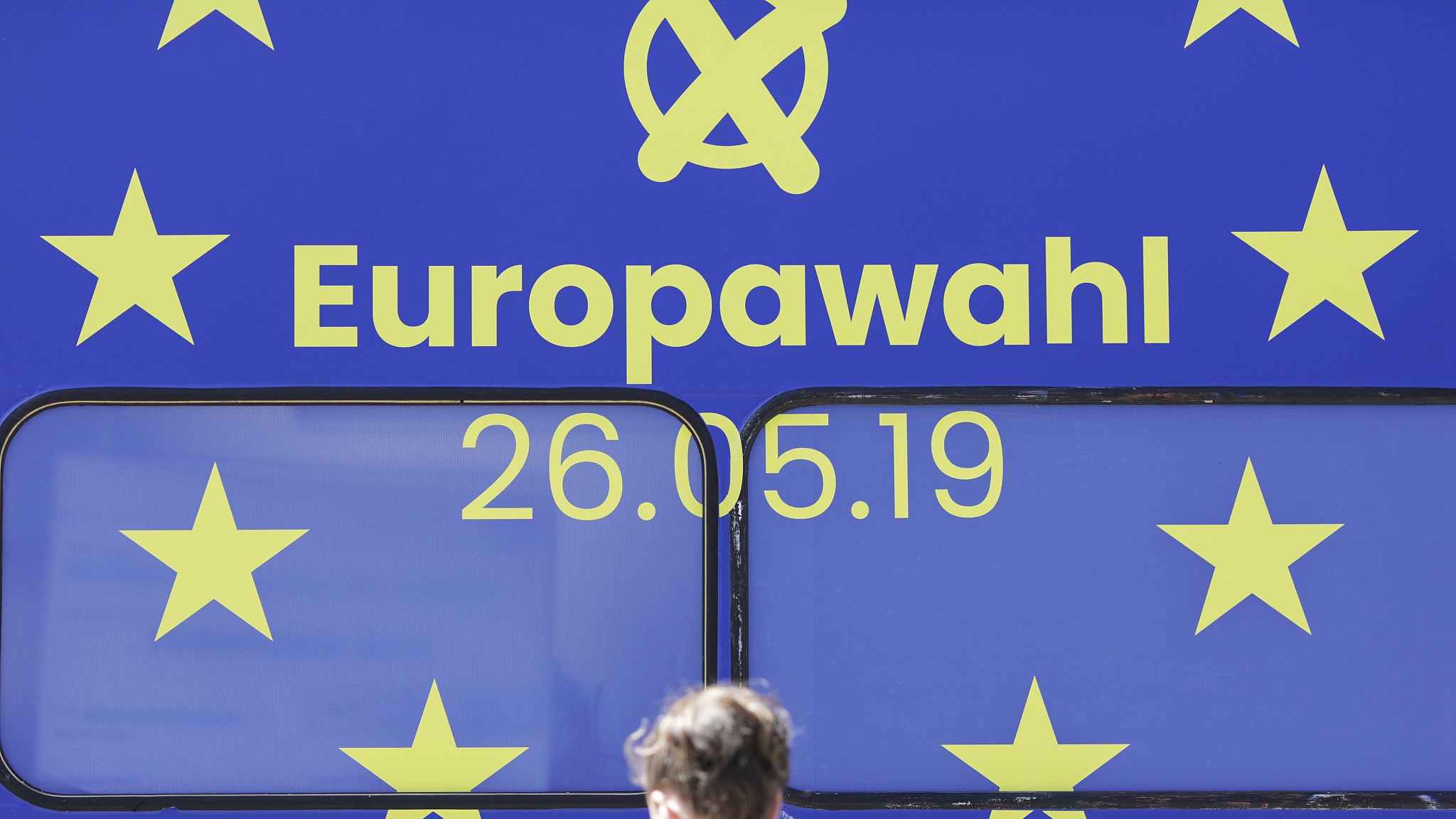IKEA, Volkswagen, Zara or Lufthansa, European companies have an unusual message for consumers and millions of employees ahead of next week's European elections: Go vote!
Over the past week, companies, trade unions and business associations, especially in Germany, have been busy urging people to cast their ballot and defend European values against rising populism.
So why this sudden mobilization?
'Future of Europe at stake'
"This European election is possibly the most important one since the European Union was founded: We decide whether we preserve the EU as a union of values for peace, freedom, social cohesion and the rule of law."
This stark warning from
the German Trade Association (HDE) came with a call on voters to "Say YES to peace and freedom, to a strong single market. Say YES to the European Union."

A post on Lufthansa's Twitter account, showing a picture of one of its planes with the words 'Say yes to Europe,' along with the comment: 'We stand for the European idea, for a unified and free Europe.' /CGTN screenshot
A post on Lufthansa's Twitter account, showing a picture of one of its planes with the words 'Say yes to Europe,' along with the comment: 'We stand for the European idea, for a unified and free Europe.' /CGTN screenshot
The letter was signed by IKEA, Spanish fashion giant Inditex – the parent company of brands like Zara, Bershka, Massimo Dutti and Stradivarius – supermarket chain Rewe and electronics retail group Ceconomy, among others.
Private banks – including Deutsche Bank, Credit Suisse, UBS, ABN AMRO and Commerzbank – made a similar appeal, as did Germany's main trade unions, who warned that "the future of Europe is at stake."
National carrier Lufthansa stenciled the words "Say yes to Europe" onto one of its planes and has been tracking its movements on Twitter; Volkswagen wrote to its 490,000 employees around Europe, encouraging them to "make use of your right to vote," and Deutsche Bahn has lit up Berlin's main train station in EU blue-and-gold.
Others putting out a "Wahlaufruf" (a call to vote) on social media and elsewhere include Thyssenkrupp, BASF and Deutsche Telekom.
Fighting intolerance, protectionism
Interest in EU elections has traditionally been lower than in national elections. But rising populism and the impact that right-wing wins could have on everything from migration and borders to trade and jobs, have made the stakes higher this time around.
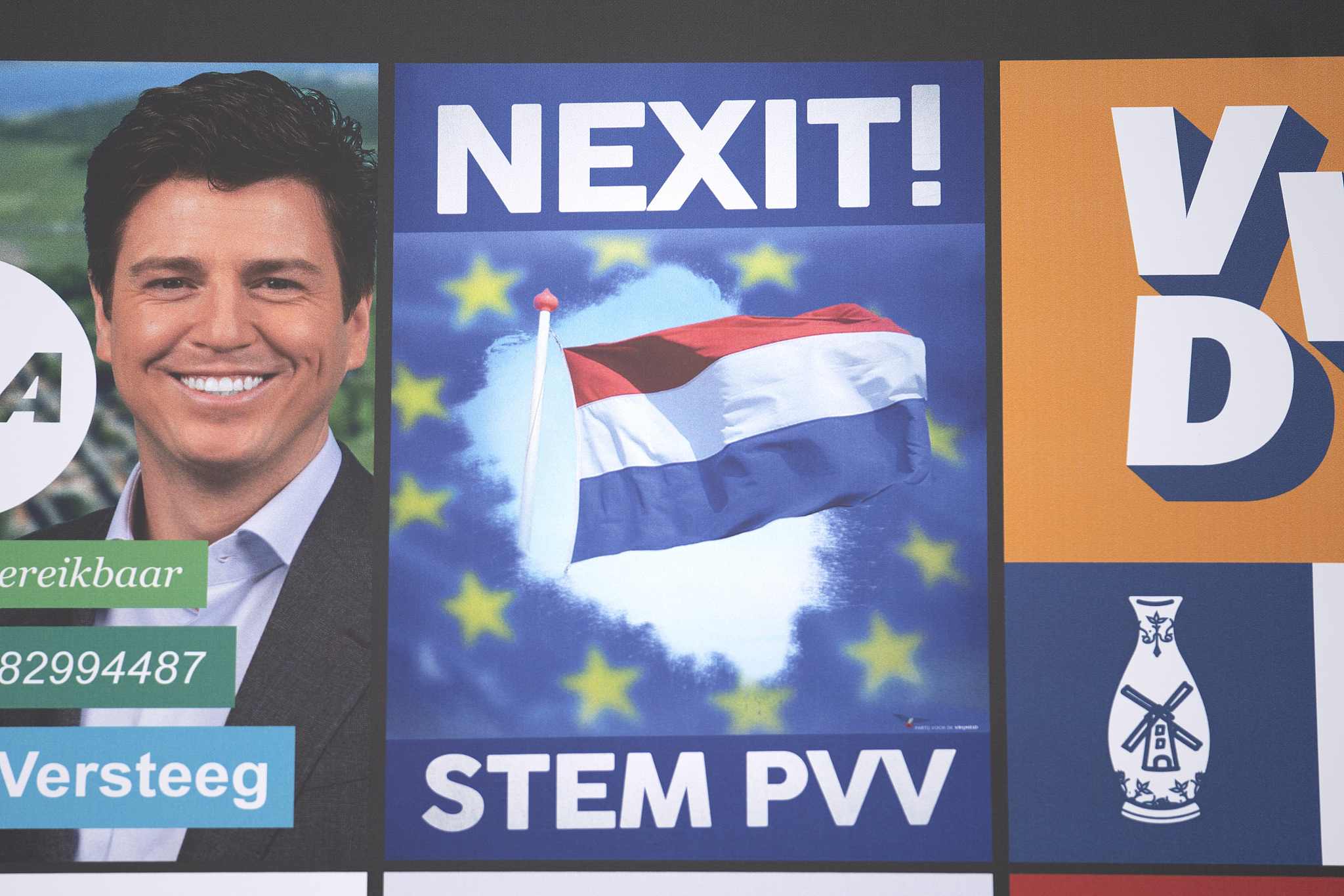
An EU election poster for the Dutch right-wing populist Party for Freedom (PVV), calling for the Netherlands to pull out of the European Union (Nexit), is pictured in Amsterdam, Netherlands, May 1, 2019. /Getty Images
An EU election poster for the Dutch right-wing populist Party for Freedom (PVV), calling for the Netherlands to pull out of the European Union (Nexit), is pictured in Amsterdam, Netherlands, May 1, 2019. /Getty Images
Far-right, Eurosceptic parties – like Alternative for Germany (AfD), France's Rassemblement National (RN), Italy's Lega Nord, Austria's Freedom Party (FPOe) and Greece's Golden Dawn – are expected to make significant gains this year, polls show.
These parties have advocated pulling out of NATO and the Paris Agreement on climate change, blocking trade agreements, reinstating strict borders and generally returning to a "Europe of nations" while flaunting the rule of law and spreading intolerance and nativist ideology, the European Council on Foreign Relations warned in
a recent report.
The AfD and a new Dutch anti-EU party, the Forum for Democracy (FvD), have both called for leaving the EU.
Unlike in previous elections, now the very existence of the European Union – a nearly 70-year political and economic project that earned the 2012 Nobel Peace Prize for contributing to "the advancement of peace and reconciliation, democracy and human rights in Europe" – is at risk, business leaders warn.
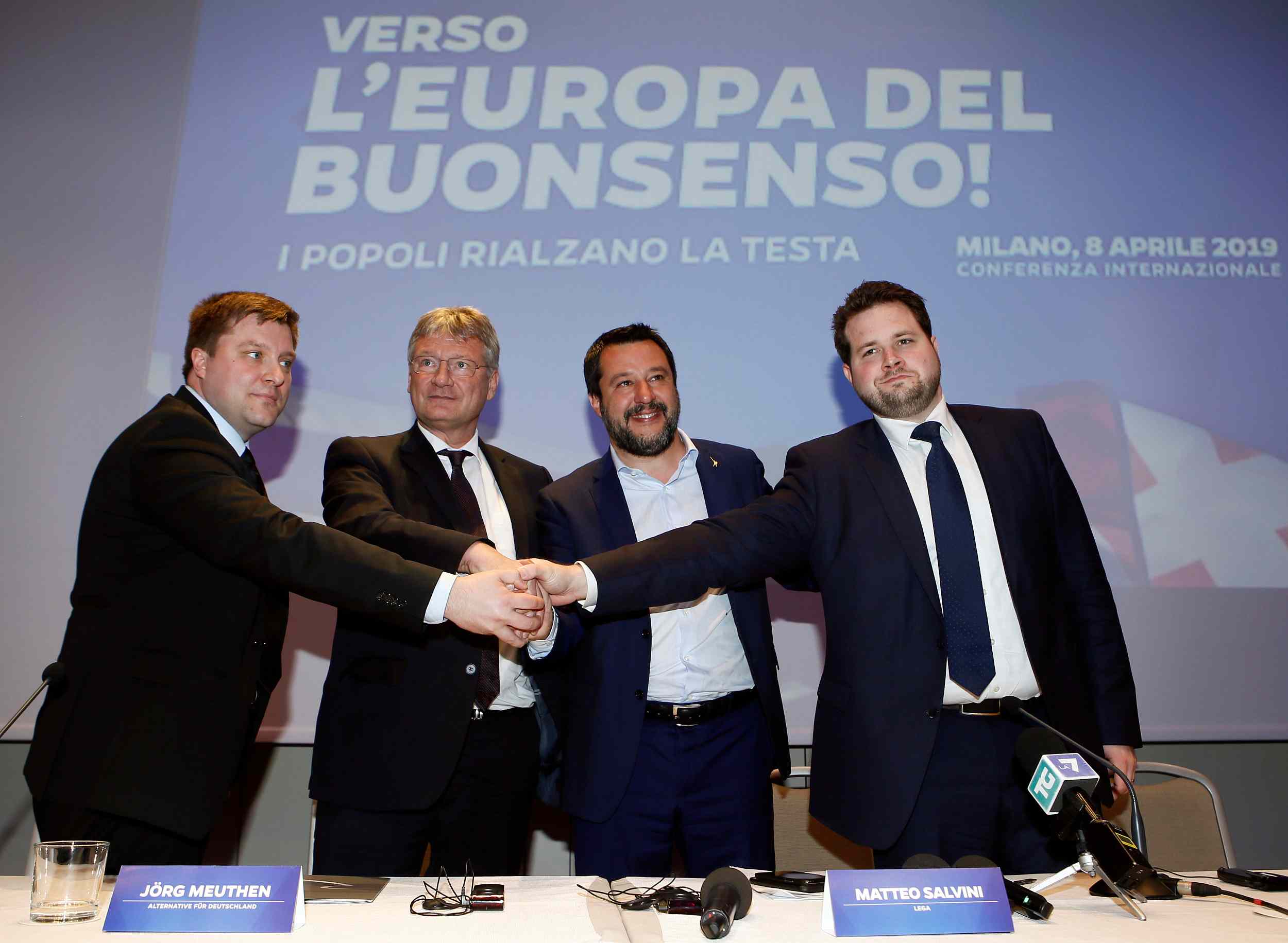
From L to R: Olli Kotro from the Finns Party, Joerg Meuthen from Germany's AfD, Matteo Salvini from Italy's Lega Nord and Anders Vistisen from the Danish People's Party, shake hands after announcing a new alliance of populist Eurosceptic parties in Milan, Italy, April 8, 2019. /VCG Photo
From L to R: Olli Kotro from the Finns Party, Joerg Meuthen from Germany's AfD, Matteo Salvini from Italy's Lega Nord and Anders Vistisen from the Danish People's Party, shake hands after announcing a new alliance of populist Eurosceptic parties in Milan, Italy, April 8, 2019. /VCG Photo
"We need more Europe not less,"
the banking union insisted, adding that it was "decidedly against nationalistic tendencies, isolationism and protectionism."
Volkswagen
reminded its employees that the union "brought the continent peace and prosperity after centuries of bloody wars and conflicts."
The world's largest trade bloc
By motivating voters, businesses are also acting out of self-interest, however.
Stricter border controls would impact the ability of multinational companies, with employees, offices and factories disseminated around the continent, to move cargo and hire foreign labor.
EU-wide regulations have also made it easier for firms to produce one-size-fits-all products and systems, rather than having to cater to 28 sets of national rules.
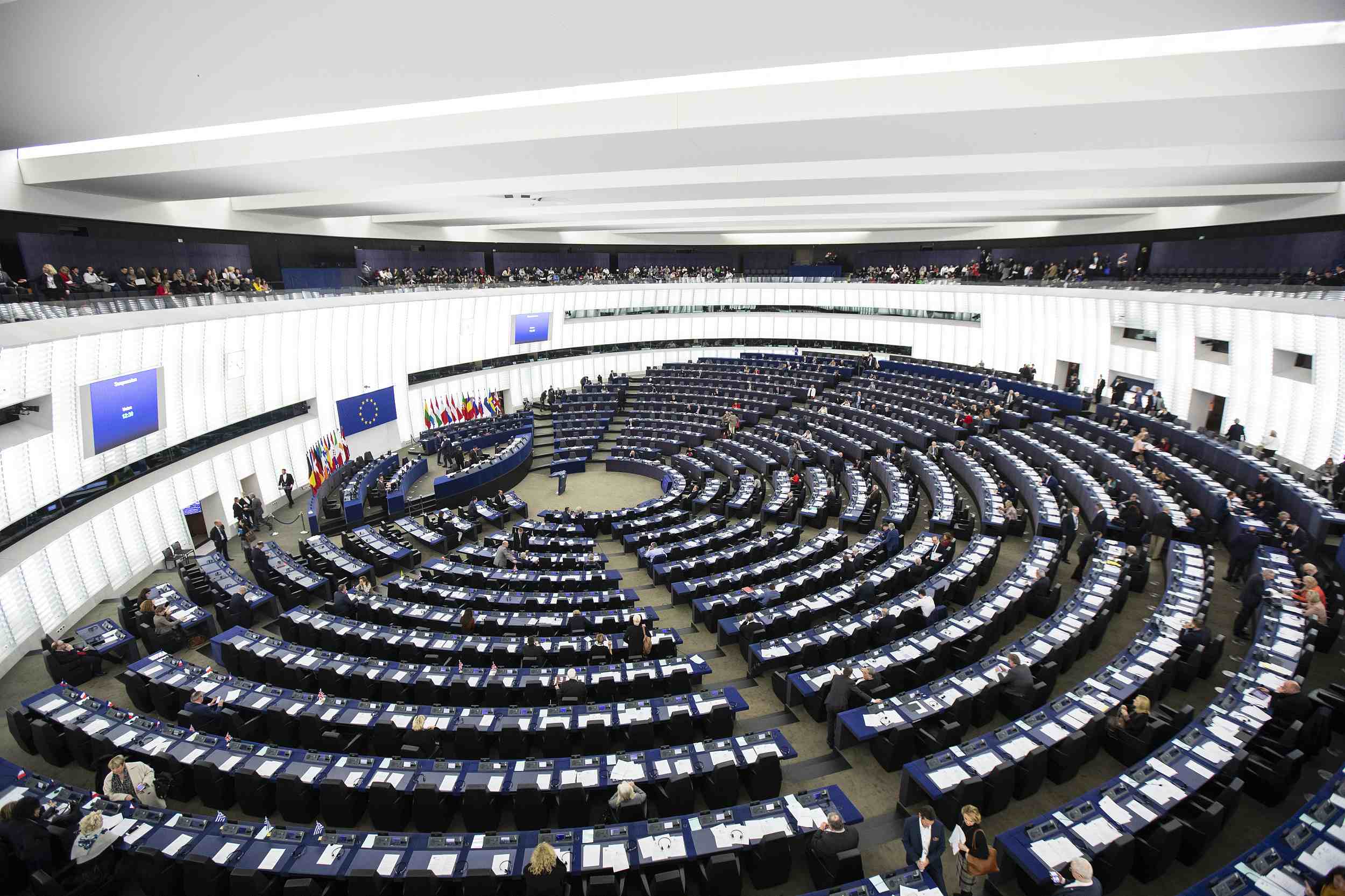
MEPs attend a session in the European Parliament in Strasbourg, France, March 12, 2019. /VCG Photo
MEPs attend a session in the European Parliament in Strasbourg, France, March 12, 2019. /VCG Photo
The European Single Market, with its free movement of capital, goods, services and people, has provided trade opportunities to big firms, as well as small and medium enterprises.
And companies also benefit from a strong European Union – the world's largest trading bloc – on the global stage.
"Only a united EU… is in a position to negotiate with other world powers as equals," Germany's BDI, BDA, DIHK and ZDH trade unions summarized in a joint statement. "Every single member state, including Germany, is too small on its own."
Germany: The EU's biggest winner
So far, mainly businesses in Germany have issued a call to vote.
According to
a recent study by the Bertelsmann Foundation, Germany – the biggest economy in the bloc and the world's third largest exporter – profits more than any other country from the single market, raking in an extra 86 billion euros (96 billion U.S. dollars) per year. As such, it stands to lose the most if it fails.
The average EU citizen also wins out however, with an additional 840 euros in his or her pocket every year, the study showed.
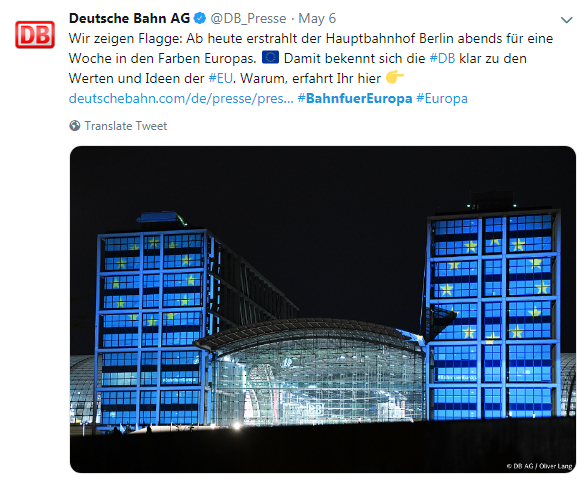
Berlin's main train station lit up with the EU flag is pictured in a post on Deutsche Bahn's Twitter account. /CGTN screenshot
Berlin's main train station lit up with the EU flag is pictured in a post on Deutsche Bahn's Twitter account. /CGTN screenshot
The key question of turnout
Over the past four decades, turnout has fallen consistently at every European election. In 1979, almost 62 percent of voters still headed to the polls. At the last election in 2014, this had dropped to 42.6 percent.
While a majority of voters stay away, those who turn up tend to be critical of the EU, so boosting turnout and appealing to centrist voters is the best way to prevent far-right wins,
according to experts.
Trade unions in France, Belgium and Austria have also made discrete appeals to voters. Far more critical of Brussels than their German counterparts, the message is still the same: Go vote, have a say, because EU decisions affect you too.
The European Parliament election will be held over several days, from May 23 to 26, in all 28 members of the bloc. Some 400 million people are eligible to vote for the next 751 MEPs.
(Cover picture: A European election campaign bus is pictured in Aschaffenburg, Germany, May 13, 2019. /Getty Images)

